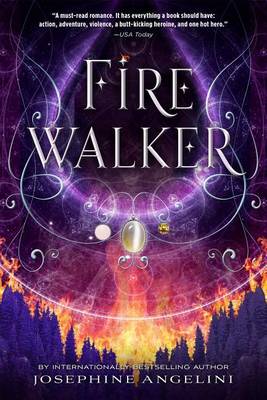Reviewed by girlinthepages on
I was fully intending to be blown away by this book. Trial by Fire had ended with such a nasty cliffhanger, with Lily and Rowan spirit walking back to modern day Salem. I was so so so excited to see how Lily and Rowan would now fit into her modern life (and I want to know WHY there's not a modern day world version of Rowan!! I can't believe this hasn't been addressed yet!!) The first 70 or so pages moved along at a really fast pace, with Lily and Rowan's arrival being messy, violent, and creating chaos to be reconciled with Juliet and Samantha. It was believable and tense and interesting, and I wanted to see them explore Lily's life in her own world, which was never really touched upon more than her crush on Tristan and penchant for allergies.
And then...things started to go wrong for me as a reader. The plot became maddeningly cliché and the writing was riddled with telling instead of showing. After loving Trial by Fire so much I know Angelini is a capable writer. I think perhaps she fell victim to her own plot elements, as the constant telling was mostly due to the fact that as a witch, Lily is able to transmit thoughts and memories to those of her claimed instantaneously. Therefore all of the new characters who are claimed by her simply receive Lily's stories via such telepathic communication leading to sentences that constantly sounded repetitive and boring: "Lily showed them....and then Lily made them feel....and then Lily allowed them to see..." It felt like a cheap storytelling technique, especially since Lily's new coven of claimed was so random and convenient that as a reader I lacked any real connection or empathy for her bond with them. Can we just talk about how random and silly it was that Breakfast, Tristan, and some conveniently introduced new girl character (Una) all are drawn to Lily and accept that she's a witch and immediately give up their entire lives to be claimed by her in the span of like fifty pages? It felt juvenile and lacked any real character development. And I could not take reading about a character named BREAKFAST as a mechanic seriously).
Once the protagonists returned to Lillian's Salem I hoped the story would revert back to its former glory. While it captivated my attention more than the first half, I was again disappointed. Most of the action was Lily, Rowan, and her new coven traveling to find the rest of the Outlanders (Harry Potter book seven wandering through the forest syndrome ahhhhh!) and then the plot veered off into focusing on the woven, as Lily is fascinated with the monstrous creatures and why even witches can't control them. (A valid question, but hardly what I was interested in reading). There was so much less focus on science, political intrigue, and social dynamics than the last book, and the settings didn't spend much time in the city, Citadel, or any public areas of Lily's modern Salem back home, the areas I was most interested in seeing and learning more about.
While I know my review has been mainly negative, I found myself able to forgive most of its literary sins because I was so enamored with its predecessor. Sophomore slumps are not uncommon in even the best of series, and I kept plugging along, optimistic. However, the one thing about this book I find hard to forgive is the inclusion of too many sub-genres. This series is having an identity crisis. Trial by Fire pushed boundaries by hovering on the edges of both science-fiction and paranormal fantasy, with elements of steam punk and psuedo-historical fiction throughout. Firewalker goes too far by veering heavily into the post-apocalyptic genre, with Lillian transmitting images of her spirit walk to a certain cinder world to Lily in an effort to explain why she's become ruthless about eradicating science. I don't want to spoil anything, but Lillian's constant visions from her cinder world experience started to feel like a overzealous retelling from The Road or I Am Legend. It was also gory and graphic to the point of being unnecessary, and it felt like it was done more for shock value than for plot necessity. The post-apocalyptic cinder world scenes became a chore to read and detracted from the elements of the series that made it so unique and impressive.
Overall: I know my review comes off as critical, but I went into Firewalker with SUCH high expectations because of my absolute love for Trial By Fire. There were elements that I enjoyed (returning to some favorite characters, the magic/science, the rituals, etc.) but they were overshadowed by the things that irked me and the plot conveniences that riddled the text. I still think that the universe and world building is strong and it's a setting where amazing plots are possible, but the sexy, lively, urban setting of the first book was lost to a muddled novel where too many genres came into play. I will most likely read the last book in the series to get all of my questions answered (it ends with quite a cliffhanger) but my heart still hurts for the novel this could have been.
This review was originally posted on Girl in the Pages
Reading updates
- Started reading
- 14 August, 2015: Finished reading
- 14 August, 2015: Reviewed
